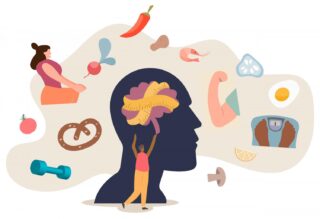
Inner Peace Therapeutic Services, LLC
22776 Three Notch Road
Suite 210
Lexington Park, MD 20653

More Mental Health Articles
Understanding Disordered Eating

Signs, Consequences, and Support
Do you feel a loss of control when you’re around food? Do you skip meals, or do you rigidly restrict your food intake? Are you consumed with thoughts about your body shape or your weight? If you’ve ever experienced these feelings and behaviors, you may be dealing with disordered eating, a term used to describe a range of problematic eating behaviors.
What Is Disordered Eating?
Disordered eating is not a specific diagnosis but rather a term encompassing various problematic eating patterns. While it may not reach the extreme levels of an eating disorder, disordered eating can still have detrimental effects on your life. The behaviors associated with disordered eating can vary in frequency and severity.
The Impact Of Disordered Eating
Disordered eating can disrupt your daily life in several ways. Those affected may miss work, school, or social events due to anxiety or discomfort around food or because of an obsessive exercise routine. This obsession with food and exercise can impair concentration and performance at work or in school. Furthermore, disordered eating can take a toll on both mental and physical health, leading to negative self-thinking and potential harm to cardiovascular and intestinal health. It also increases the risk of developing a full-fledged eating disorder.
Recognizing Disordered Eating
If you identify with any of the following behaviors, you may be experiencing disordered eating:
- Frequent dieting or obsessive calorie counting.
- Rigid food restriction or skipping meals.
- Feelings of anxiety, guilt, or shame related to certain foods or food in general.
- Excessive or obsessive exercising, sometimes as a form of punishment for overeating.
- Binging and/or purging.
- Low self-worth or self-esteem tied to your weight or body shape.
- A sense of being out of control around food.
Seeking Help and Support
Understanding the root causes of disordered eating can be complex and varies from person to person. Individual therapy can help you explore your past and the factors that led to these behaviors. Through therapy, you can learn to accept and love yourself as you are and work with a therapist to develop healthier habits and coping mechanisms for difficult triggers.
Other Articles You May Find of Interest...
- What is High Functioning Anxiety?
- The Promise of Spravato: Revolutionizing Depression Treatment
- What is OCD? Signs and Treatments
- Mindful Recovery: Incorporating Mental Health in Addiction Treatment
- Affordable Therapy for All: ‘Gonna Be Ok’ Makes Mental Health Support Accessible
- The Challenges of Being an LGBTQ+ Parent
- Embracing Healing: Navigating the Emotional and Physical Journey of Mastectomy Recovery

















